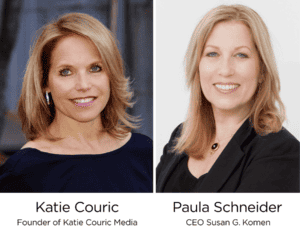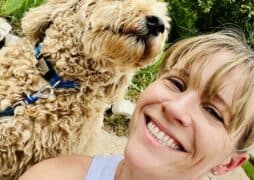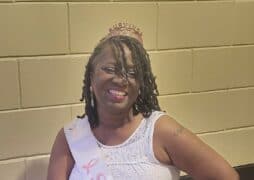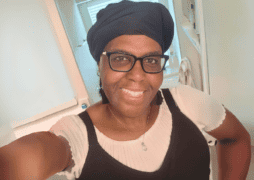Listen to Katie Couric and Susan G. Komen CEO Paula Schneider discuss breast cancer needs and experiences.
Automated Transcription:
Hi, and welcome to this week’s episode of the care talks cancer podcast. Each week we’ll be hearing from patients, survivors, caregivers, advocates and healthcare professionals to do a cure does best provide cancer updates, research and education.

Host: In this week’s episode, we spoke with Katie Couric and Susan G. Komen CEO Paula Schneider as they opened up about their experiences with cancer, one as a caregiver, the other as a patient, the pair have teamed up for your cancer story, a platform designed to share patient stories to ensure an individual affected by a cancer diagnosis never feels alone. To help highlight Breast Cancer Awareness Month, Katie and Paula shared their stories and noted how the program can help raise awareness around breast cancer.
So okay, well, let’s kind of start with you. I know we’re familiar with it. And we’ve talked to you before about this program. But can you just talk about what your cancer story program is, and kind of what inspired you to get involved?
Katie: Well, obviously, I have gone through my own cancer journey, as a caregiver, not as a patient. And when Merck approached me about this extraordinary program and platform that they’ve developed, I thought, Gosh, I wish something like this existed when my husband Jay was diagnosed with cancer in 1997.
And a few years later, my sister Emily was diagnosed with pancreatic cancer. And it’s just an extraordinary resource for people who are going through this experience, not only does it have firsthand accounts of what cancer patients wish they had known when they started out on their journey and caregivers as well. But it just has all kinds of resources for people who want to feel less alone.
My husband Jay said, having cancer is the loneliest experience in the world. And I think as Paula will tell you, it can be incredibly isolating. So the idea that people would have a place to go, and especially during this unprecedented time, we talked to some patients about being diagnosed with cancer in the age of COVID. So that’s a double whammy, it’s so traumatizing to receive this diagnosis in the first place.
And then to have to go through it in the midst of a pandemic, that that significantly curtails your social interactions, your support system makes you nervous, even just going to, to a medical facility to get treatment. And of course, more importantly, or just as importantly, rather, to get screened, so that your cancer can be dealt with at the earliest possible stage. I mean, you put those together, and that’s a recipe for tremendous anxiety. So I was really, really felt privileged and honored to be able to support a program that I think will help so many people.
Host: Absolutely, yeah, no, I think that’s a great resource for individuals right now, especially with everything with COVID. So Paula, you recently joined the platform as well, can you just tell us a little bit about your story and what you shared?
Paula: Yeah, you know, it was a really, very heartfelt moment for me because what they asked me to do was to write a letter to my pre cancer self sort of giving yourself advice for what what’s to come and knowing, you know, of course, you don’t know then that you’re going to have cancer.
So I wrote myself a letter talking about how you are going to get cancer meaning me that your mother is going to die from metastatic breast cancer, which she did, your brother is going to die from prostate metastatic cancer, which he did and my sister had melanoma. And she’s thank god, okay. But you know, it’s been a sort of a centerpiece in my family for a long time, and I have two daughters.
So, you know, for me, that sort of enough said, but you know, I wouldn’t be sitting here in the chair at Susan G. Komen, if I have not had this experience. And you know, I think it’s one of the blessings in life for me as well. And it’s hard to say that because it’s such a hideous thing to have to go through. But I’m now here helping people every day. And hopefully we’ll find a way to crack the code and make some significant investments in cancer in and finding the cure. Almost every major breakthrough in breast cancers has Susan G. Komen’s fingerprints all over it. So, you know, we’re continuing on in what is a very difficult time.
Host: Absolutely. And so I know part of the program is to kind of write a letter to your pre-cancer self. So can you follow, Can you each you know, if you looked back, what is one piece of advice that you’d give to your younger self before the cancer journey?
Paula: I think its, don’t sweat the small stuff, right? The things that are really important are highlighted for you. And that is, you know, your sense of community, your family, your friends, you know, the love that you share. It’s not spending one more day at work. It’s figuring out what is most important, and putting those list and his top priorities because you know, you don’t know how long you have, you don’t know if it’s going to end well or not, it didn’t end well for my mom, or for my brother. Right? So, you know, I’m 13 years out, but you got to find the joy every single day in, you know, otherwise, you just missed a day. And you don’t get it back.
Katie: Well, Paula made me think about life’s little instruction book, which came out many years ago, was sort of words of wisdom. And I remember one of them was no one on their deathbed says, Gee, I wish I’d spent more time at the office. And, you know, I do agree with Paula, it’s so important that you appreciate every day, that you appreciate the people in your life, that you tell them why they’re important, and why you love them.
And I also think, you know, it’s important to, to really learn how to how to face the illness, with with some degree of honesty, I think, for me, I, I wasn’t honest with my husband about his illness. And he was such a smart person. And it was so out of character for him not to want to know everything about his disease, but I think people deal with a cancer diagnosis and so many different ways.
And, you know, so I kind of took the role of, of spearheading his treatment and doing all the research and trying to find, you know, the best therapies and what was being developed. And he didn’t want to know. And so I think, in retrospect, I wish we had gone to somebody who would have helped us talk about the really hard stuff that we had a really hard time facing, and really never did. And, you know, I think that I felt that if I ever talked about the possibility he might die, he might think that I had given up on him.
So I think there’s this very, very tricky and delicate balance that people don’t talk about when it comes to really facing a terminal illness, and how you how you manage to navigate it, and I’m writing a book right now, a memoir, and I talk a lot about this, and about, you know, what could I have done differently, and, you know, medically, I did everything under the sun, I could not have done more. I mean, there was no stone left unturned, but emotionally, I’m just not sure. I gave Jay permission to talk about those very painful things like his hopes and dreams for his daughters, or the kind of things he wanted me to do for him, you know, in his memory, I just, those are really, really hard conversations. I don’t know if Paula was able to have those conversations with her mom. But Jay’s disease advanced so rapidly, and we never had kind of a period of stabilizing his cancer that, that we could kind of have those conversations. And, you know, obviously, I think I need a little more therapy on this.
Paula: Well, you know, one of the things, Katie, that I will say is that, you know, when I interviewed doctors for my own treatment, if they didn’t feel that I was going to come out of this, okay. And you know, and maybe it was just my half classical, right? I literally did not I fired doctors, and said, If you don’t feel that I’m going to be alright, I’m not going to go with you, because I have to feel that way. So I can understand how Jay might have been too afraid to talk about it. Because, you know, you really want to stay on the positive side, but there’s a fine line that you have there. It’s a very difficult thing, and those are difficult conversations.
Absolutely. And so I know, you know, this program has obviously existed for a while, but but Paula, can you just discuss a little bit about the involvement with breast cancer awareness month and what you and others are doing to support the breast cancer community during this time with the program?
Paula: Yeah, I mean, you know, we are a patient advocate organization. So we look at everything from the patient standpoint. Right. And we want to help people where they are, right. So if this helps by giving a little bit of hope, or at least, you know, a perspective of what can happen, because not all outcomes are good, right? We know that. And you really hope that if you are going through this, that you will have good outcome.
So I think it is an honest way to speak about it, you know, I played this for my husband, and he had tears in his eyes and said, I don’t like this. And I said, I understand. But you know, that’s how I feel. That’s how I felt when I was writing, you know, when I was rewriting the letter and reliving the past, it’s a hard thing to do. But life was sometimes hard. And you have to accept that there may not be, you know, sunshiny rosy outcomes. You know, when we, we, a lot of times, at Komen, sort of get lumped in that everything is pink and positive. And it’s not, right, you know, so we want to make sure that we show what the real disease is like, because this is a disease, it’s a disease that takes people from their families, it’s a disease that you know, when you are the one that has the disease, you have to be, you know, you’re scared to death that you have to say goodbye to everyone.
So it’s, it’s a, it’s a challenge. But I like the honesty of it. And I like the way that it feels because people can be very honest with what they might have said to themselves. And it could be kind of surprising for other people that are around them to hear it. But I think just, you know, opening up the conversations, having those difficult conversations being real about what this is, it’s not, it’s not pretty, it’s not fun, it’s a misery. But you know, you got to deal with it. And you got to put one foot in front of the other and just keep going. So I think it sort of has that feel it’s got a little bit of grit to it. But it also provides a lot of information. I think it’s helpful.
Host: Yeah, absolutely. That’s fantastic. And so Katie, I mean, I know obviously, your journey was a little bit different in that your husband wasn’t diagnosed with breast cancer, but kind of going off what you’ve been through as your husband’s caregiver and seeing what he went through. Do you have any advice for the breast cancer community that you could offer up?
Katie: Well, the breast cancer community is really part of the larger cancer community. I think that it’s incredibly important to get screen, to understand your family history, to make sure that you’re your own best advocate, that you’re proactive about your health, I think this goes for everything. And that you talk to your doctor, and you see another doctor, if you feel like that doctor isn’t giving you important information that will either prevent cancer or treat your cancer as if you are going to be a survivor.
And so I think that, especially during COVID, you know, I read that in the next decade, there may be, you know, 10s of 1000s of cancer related deaths, because they weren’t diagnosed early enough, because people are more trepidatious than ever, about getting the proper screening they need because of COVID. And I think that we have to really encourage people and reassure them that doctors are taking all the proper precautions, and that this, it’s not going to be, you know, dangerous to go to the doctors to get screened, it’s going to be dangerous not to go to the doctor to get screening. So I just want to encourage people that even though it’s a scary time, and we’re not on the other end of this pandemic, you really can, you must must continue to be your own best advocate and to take care of your health.
Host: Absolutely, no, that’s great advice. And so, you know, we’ve talked about the pandemic and obviously, it’s, it’s breast cancer awareness month right now. So Paula, do you have any resources that we could offer to our patient and caregiver audience during you know, either whether it pertains to breast cancer or maybe the pandemic and everything that’s going on right now?
Paula: Yeah, first of all, there’s the phones are ringing off the hook at Komen right, because people are scared. They’re trying to figure out how to navigate through to crisis in their life if they have a breast cancer diagnosis and of course, COVID, right. So we have, if you go to Komen.org, we have a helpline, that is where we have man with psychosocial workers that are the voice of reason, they’re calm, they know what questions to ask, they can help you to navigate this. So that’s certainly one resource.
The other resource that we have is a Treatment Assistance Program. And that is if you are having difficulty making ends meet and stay in treatment, then we may be able to help you with a monthly stipend that can help from a financial standpoint because financial toxicity is the price Probably the biggest hamper for continuing and staying in treatment, if you don’t stay in treatment, your outcomes are not good.
So we’re happy to help as much as we possibly can, because cancer isn’t cancelled. And you know, like Katie had said, there’s there’s somewhere between 50 and 80% down and diagnoses, you know, which just doesn’t mean that it’s not not happening we just didn’t magically have so far less cancers, we just have people that are too afraid to go to the doctor, you gotta go. Because the outcomes could be so much more dramatic, hopefully COVID will come and go. But cancer is, is is here, and it’s not canceled. You got it, you got to take care of yourself.
Host: Absolutely. And so kind of as a parting thought, what are you each hoping that our patient and caregiver audience can kind of take away from the program and, and really take away from this and move forward in their journeys?
Katie: Well, I think that people need to take away from from this program is that you’re not alone. You can go to your cancer story.com You can hear stories like Paula, you can hear stories, like so many patients and caregivers who are really sharing what they’ve learned. And those things can be so instructive to you.
And, you know, I think right now, everybody needs support, whether they have cancer or not. Because this has been a very, very trying and difficult time. And I think just just know that it’s out there, it’s available, I would have given anything to have had this in 1997.
When my husband was diagnosed, and I felt so alone and so confused and so unmoored. And there are things that you can do and places you can go to get support. So even if you’re hesitant, even if you’re embarrassed to admit that you need help, even if you’re shy or introverted, just know there are so many different ways, and I think your cancer story.com is just a fantastic way to start. Yeah, there’s hope. Keep the faith, there’s hope. And there’s there’s so much research that’s being done as well. And it’s true. You know, I…sorry to interrupt Paula. But it is so exciting. We’re on the precipice of so much exciting new medical research and treatments, you know, as somebody who started Stand Up to Cancer and works with brilliant scientists every day who are collaborating, and not competing on new treatments and therapies and preventive measures and techniques.
But you know, when you think of everything that’s going on, whether it’s immunotherapy and monoclonal antibodies that we’re seeing, actually happen with COVID cases, all sorts of new exciting treatments that are personalized and targeted therapies and ways to bolster your immune system so it can stop the cancer in its tracks. And how many people experts are working together engineers and physicists and basic biologists and people who, you know, epigeneticists, I mean, it’s such an exciting time for cancer research. And there, that’s so true that, as Paula said, You can’t give up hope. And we have to support our scientists, you know, they need the funding to continue working together to continue coming up with new and novel therapies. And there, it’s it’s within our grasp, you know, we’re seeing lifespans expanded extended, we’re seeing people getting cured of diseases with new therapies, so we have to keep our foot on the gas pedal, and we have to keep supporting the scientists that are so tirelessly, who in my view are the unsung heroes of our of our world.
Host: Don’t forget to subscribe to the cure talks, cancer podcasts on Apple podcast, Spotify, or other apps to your every episode, or visit www.curetoday.com/podcasts. The Cure talks cancer podcast is the official podcast of cure magazine, the indispensable guide to every stage of the cancer experience. For more information visit us cure today.com and find us on Twitter at at Cure underscore magazine or Facebook at at Cure Magazine.



